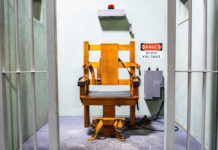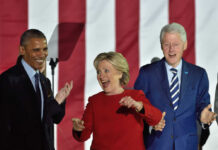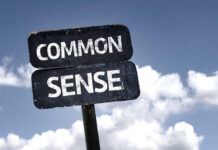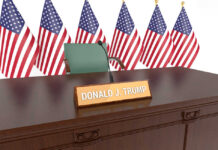
Jake Lang, a January 6 defendant, has been jailed for nearly four years without trial, betting his freedom on a Trump pardon.
At a Glance
- Jake Lang, from New York, is the longest-serving January 6 inmate, jailed for almost four years without trial
- Lang faces serious felony charges for allegedly assaulting police officers during the Capitol riot
- His trial has been delayed multiple times, with the latest postponement based on hopes for a Trump pardon
- Judge Carl Nichols granted a two-month delay, moving the trial to February, despite expressing frustration
- Over 1,500 defendants have been arrested for their roles in the January 6 riot
The Longest-Serving January 6 Inmate: Jake Lang’s Unorthodox Legal Strategy
In a stunning display of our two-tiered justice system, Jake Lang, a New York man accused of participating in the January 6 Capitol riot, has been cooling his heels in jail for nearly four years without a trial. That’s right, folks – in the land of the free, where we supposedly have the right to a speedy trial, Lang has been denied his day in court for longer than most college degrees take to complete. But here’s where it gets interesting: Lang’s not exactly chomping at the bit to face a jury of his peers. Instead, he’s playing a high-stakes game of “pardon me, Mr. President.”
Lang’s attorney, in a move that would make Machiavelli proud, has managed to secure yet another trial delay. The reason? They’re banking on what they call “a seismic shift in federal policy regarding January 6 defendants.” Translation: They’re hoping Trump rides back into the White House on a white horse, pardons in hand. It’s a bold strategy, Cotton. Let’s see if it pays off for them.
The Charges: Batting for Freedom?
Now, let’s not sugarcoat it – Lang isn’t accused of taking an unsanctioned Capitol tour. He’s facing some serious felony charges, including allegedly wielding a baseball bat against law enforcement officers. In any other context, that would be assault with a deadly weapon. But in the topsy-turvy world of January 6 prosecutions, it’s apparently just another day at the ballpark.
Jake Lang's trial on charges of beating cops at the Capitol on Jan. 6 has been delayed again as he hopes for a pardon when Donald Trump takes office. https://t.co/0J5n2uwwj8
— lohud.com (@lohud) November 21, 2024
“Lang’s assertion that he is a candidate for a presidential pardon is purely speculative and does not warrant delay of his trial” – Karen Rochlin
Prosecutors, in a shocking display of common sense, argue that a potential pardon is about as solid as a politician’s promise. They’re pushing for the trial to proceed, probably under the quaint notion that justice delayed is justice denied. But in the circus that is our current legal system, such outdated concepts seem to hold little water.
The Judge’s Dilemma: Frustration Meets Delay
Judge Carl Nichols, caught between a rock and a hard place, granted a two-month delay, pushing the trial to February. His Honor expressed frustration at the idea of blanket pardons for January 6 defendants, which is about as effective as expressing frustration at the weather. It changes nothing, but at least it’s on record.
“There is a tornado and a hurricane outside this building right now and his name is Donald Trump. And he’s sweeping through the Department of Justice.” – Jake Lang
Lang, for his part, remains optimistic about a pardon, confident in Trump’s influence over the Department of Justice. He’s quoted as saying there’s “a tornado and a hurricane outside this building right now and his name is Donald Trump.” One has to admire the poetry, if not the legal strategy. It’s a bold move to bet your freedom on meteorological metaphors and political winds, but in today’s America, it might just be crazy enough to work.
The Bigger Picture: A Nation Divided
As Lang’s case drags on, it serves as a microcosm of the larger January 6 saga. With over 1,500 arrests tied to the riot, each case becomes a battleground not just of legal arguments, but of political ideologies. Trump’s campaign trail hints at pardons for a “large portion” of January 6 defendants have only fueled the fire, turning courtrooms into de facto political arenas.
In the end, Lang’s story is more than just a tale of one man’s legal woes. It’s a stark reminder of how deeply divided our nation has become, where even the basic concepts of justice and due process are now viewed through partisan lenses. As we watch this legal drama unfold, one can’t help but wonder: Is this still the America we thought we knew? Or have we stepped through the looking glass into a world where justice is just another political football to be tossed around? Only time – and perhaps the next election – will tell.






















